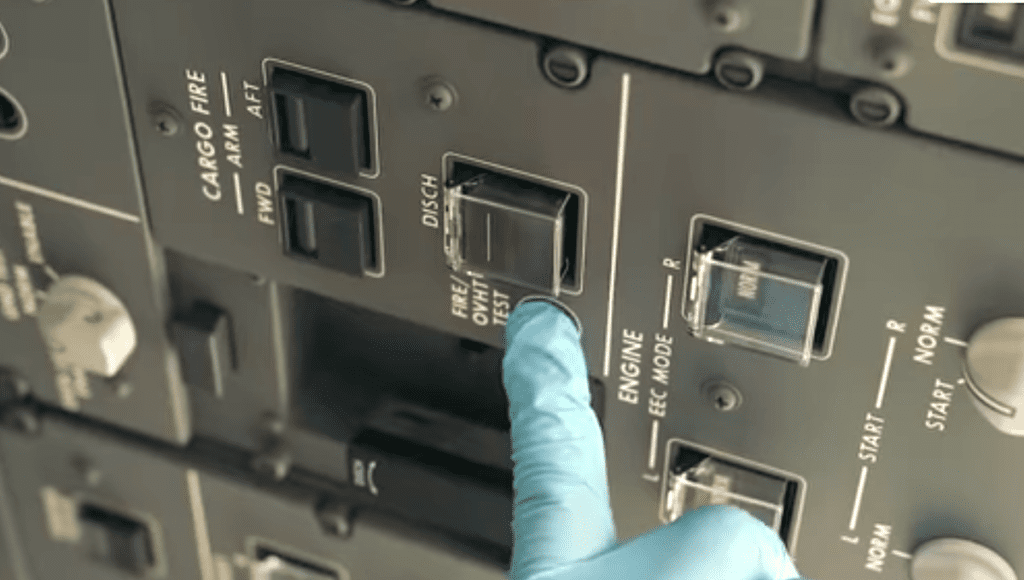
Airlines based in the Middle East are resuming limited flight operations in support of COVID-19 passenger repatriation and going through maintenance checks, such as disconnecting batteries, as an Etihad Airways technician pictured here does. Photo: Etihad Airways
Middle Eastern carriers are resuming limited passenger flights, using the grounding of airplanes to perform extensive maintenance checks and introducing new airport testing and mask wearing requirements in response to travel restrictions resulting from the COVID-19 coronavirus.
Both Emirates and Etihad added more cities to their flight schedules this week, as both carriers have slowly been resuming international flying since the beginning of April. Emirates first received approval from UAE civil aviation officials to start carrying passengers on flights Dubai to London Heathrow, Frankfurt, Paris, Brussels and Zurich, with four flights a week to London Heathrow Apr. 2.
As part of a new partnership with the Dubai Health Authority, Emirates also introduced its first COVID-19 blood testing for passengers prior to a flight to Tunisia Apr. 15.
“The testing process has gone smoothly and we would like to take this opportunity to thank the Dubai Health Authority for their initiatives and innovative solutions. This would have not been possible without the support of Dubai Airport and other government authorities. We are working on plans to scale up testing capabilities in the future and extend it to other flights, this will enable us to conduct on-site tests and provide immediate confirmation for Emirates passengers traveling to countries that require COVID-19 test certificates,” Adel Al Redha, Emirates Chief Operating Officer said in a press release.
On Apr. 16, the Dubai-based carrier also added three new weekly flights to Manila as part of a repatriation program for Filipinos needing to return home. As part of the flight operations they have resumed, Emirates is requiring passengers to wear their own masks inside of airports and while onboard aircraft.

Emirates in coordination with Dubai Health Authority (DHA) will be introducing additional precautions. Passengers on a April 15 flight to Tunisia were all tested for COVID-19 before departing from Dubai. Emirates is the first airline to conduct on-site rapid COVID-19 tests for passengers. Photo: Emirates
Abu Dhabi-based Etihad Airways provided an operational update Apr. 16, noting that it expects to begin operating a “reduced network of scheduled passenger services” starting May 1. Since March 25, the airline has operated 500 total special passenger, freighter and cargo flights to destinations such as Amsterdam, Bogota, Brussels and Dublin, among others, in support of COVID-19-related medical transport and passenger repatriation flights.
“We are implementing a series of network-wide route and fleet efficiencies, while conducting an extensive brand study and trialing new service concepts in our guest experience proposition,” Tony Douglas, Group Chief Executive Officer, Etihad Aviation Group said in a press release that featured the latest operational update. “We are also using this time to drive further internal improvements in the efficient use of automation and technology across all areas of the business, while maintaining productivity, creativity and quality.”
Etihad’s engineering division is also said to be undergoing what the airline says is the “biggest aircraft maintenance program in its history.” This will include maintenance work on 96 passenger aircraft including 29 Airbus A320 and A321s, 10 Airbus A380s, 38 Boeing 787s, and 19 Boeing 777-300ERs. Thus far, the team has checked 5,000 aircraft touch points and laundered almost 19,000 seat covers.
In Doha, Qatar Airways has been focused on increasing its cargo carrying operations, with an Apr. 8 update from the carrier confirming it has transported more than “50,000,000 kilograms” of medical and aid supplies in support of countries combating the pandemic. Additional capacity has also been introduced by Qatar to cities such as Shanghai, Guangzhou, Paris, Amsterdam, Muscat, Kuwait, Delhi, Beijing and Melbourne.

Etihad Airways is partnering with Australian company Elenium Automation to trial new technology which allows self-service devices at airports to be used to help identify travelers with medical conditions, potentially including the early stages of COVID-19. Etihad will be the first airline to trial the technology, which can monitor the temperature, heart rate and respiratory rate of any person using an airport touchpoint such as a check-in or information kiosk, a bag drop facility, a security point or immigration gate.
On Apr. 14, Qatar signed an $850 million financing agreement with Irish aircraft leasing firm Standard Charter to fund the purchase of seven Boeing 787-9s.
“The bank has been a close partner of Qatar Airways for many years and have proven their support for the airline by closing this transaction during difficult times resulting from COVID-19. Qatar Airways focus remains on finding solutions to get as many people back to their homes to be with their families and loved ones during these difficult times and this is made possible by the support we have from so many people including our close partners such as Standard Chartered,” Qatar Airways CEO Akbar Al Baker said in a statement confirming the financing agreement.
Although limited flight operations are resuming, and cargo operations as well repatriation flights continue, airlines collectively in the region are still losing revenue from the significant decline in passenger flights. The International Air Transport Association’s (IATA) latest projections estimate up to $19 billion in revenue loss for airlines based in the Middle East in 2020 compared to 2019.